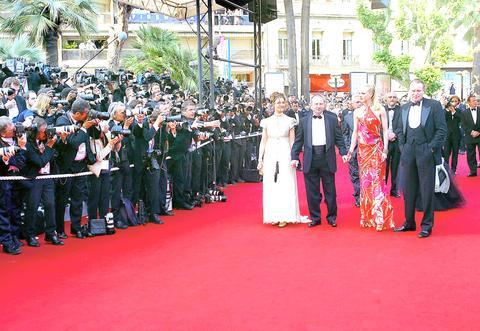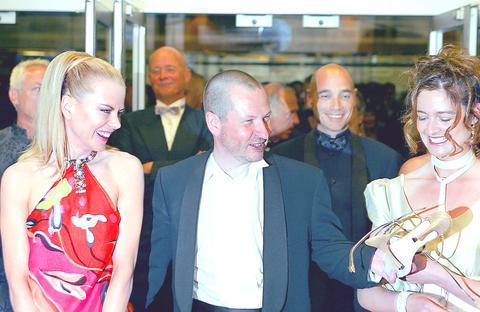After five days of rather peaceful screenings and the usual parties, the sixth day of the 56th Cannes Film Festival finally saw some fireworks yesterday, with Danish maverick director Lars Von Trier lighting the fuses.
Von Trier was premiering his latest film, Dogville, starring Nicole Kidman and got involved in a confrontation with journalists at the following press conference for the film. Kidman, meanwhile, looked uneasy throughout the ordeal, smoked nervously, and tried to be supportive of the director, but still ended up being bullied by him.

PHOTO: AFP
"Could you tell the public right now, saying yes, you'll be playing the next two parts of the trilogy after the first Dogville?" Von Trier demanded. "Yes, I already promised you yesterday," Kidman replied with an embarrassed look.

PHOTO: AFP
The controversial director's new film is seen as a damning indictment of the American way of life. It presents a seemingly ordinary tale and then develops it, brilliantly, into a story of ridicule and madness.
But his caustic take on America has also caused resentment. Like many of his previous films, the reception for Dogville was a wildly contrasting mixture of cheers and catcalls.
After the screening, however, came the real drama, as critics were herded into the press conference room, where Von Trier was first questioned about his non-realistic style of filmmaking.
Dogville is about an American town in the 1920s, yet the entire film was shot in a studio in Copenhagen, in a style similar to a stage play. Von Trier was asked why he did this.
"I'm not afraid of making a film in strange ways. I don't think it's a challenge for me. It is maybe challenging to shoot with lots of actors at the same time, and of course, to finish the project. But it's not the style that I find difficult," he said.
"I actually wanted to do a film in such a way because it keeps the fun and enjoyment when we are reading the script."
The press then focused on the relationship between Kidman and Von Trier, as the filmmaker is known for being demanding with his actors, such as Emily Watson in Breaking the Waves and Bjork in Dancer in the Dark. There have been rumors that Kidman was almost driven mad during shooting for Dogville.
"I am willing to take this journey. He has strong belief in the film and that makes me believe," Kidman said. "The first time I read about the story and the part when I had to be chained with an iron hook on the neck, I was like `Okaaaay ....' But once you take a leap of faith, it becomes a commitment and a matter of trust."
A journalist asked if there had been any arguments between the two. "Our relationship is good. The first week was a bit tricky. We had pre-conceptions of each other. But after three hours walking in the forests, after the tears and screaming at each other, we opened up our minds to each other," Kidman said.
In the film, Kidman plays a beautiful woman trying to escape an isolated small town.
Wanting the villagers to accept her, she tries helping them out by laboring in the garden and taking care of the young and the sick. A righteous-looking, philosopher-type defends her and she falls in love with him.
However, a series of unfortunate events ensues and she ends up becoming a sex slave, when a mysterious man in a black car turns up at the village.
US journalists asked why there had to be so much torture? And why was it always a women being tortured?
Von Trier's face reddened and he replied, "I don't find it exciting to see torture scenes with men. But it's just [my] personal [view]. I think it's a superficial way of looking at the film. I don't think the film is telling the same story. Many filmmakers make the same stories. It's a kind of style, I would say. If you don't like the film, take it or leave it. But there are people who like the film."
The critics responded by targeting the almost three-hour long film for its implied criticism of the American way of life.
"It's not a uniquely American story. I've never been to the country but we have a lot of knowledge, information and images about
American life," Von Trier said.
"The story of Dogville, is based on a Bertolt Brecht song Pirate Jenny,and provides an allegory or warning to America for its treatment of others, including making war on other countries.
"Actually I feel like being an American. I may have received wrong or incomplete information about America. But I'm just a mirror. I don't see the country now, how it should be. Maybe we should start a campaign, a `free America movement, just like the `free Iraq movement.'"
Sitting beside the director, Nicole Kidman tried to light a cigarette, perhaps to ease the tension. But the demanding director turned round to her in the middle of his talk and said, "Nicole, please you promised me," as if to say she should not smoke. Kidman responded with an awkward smile.
When Kidman was asked by the press if she would continue working with Von Trier, the director then grabbed the microphone and said, "Could you tell the public right now, saying yes, you'll be playing the next two parts of the trilogy?"
Kidman gave her assent and the press conference ended on this note of embarrassed commitment.
"Yes, it's a challenge for me and I will be doing it [the second two parts of the trilogy]."

Late last month Philippines Foreign Affairs Secretary Theresa Lazaro told the Philippine Senate that the nation has sufficient funds to evacuate the nearly 170,000 Filipino residents in Taiwan, 84 percent of whom are migrant workers, in the event of war. Agencies have been exploring evacuation scenarios since early this year, she said. She also observed that since the Philippines has only limited ships, the government is consulting security agencies for alternatives. Filipinos are a distant third in overall migrant worker population. Indonesia has over 248,000 workers, followed by roughly 240,000 Vietnamese. It should be noted that there are another 170,000

Hannah Liao (廖宸萱) recalls the harassment she experienced on dating apps, an experience that left her frightened and disgusted. “I’ve tried some voice-based dating apps,” the 30-year-old says. “Right away, some guys would say things like, ‘Wanna talk dirty?’ or ‘Wanna suck my d**k?’” she says. Liao’s story is not unique. Ministry of Health and Welfare statistics show a more than 50 percent rise in sexual assault cases related to online encounters over the past five years. In 2023 alone, women comprised 7,698 of the 9,413 reported victims. Faced with a dating landscape that can feel more predatory than promising, many in

“This is one of those rare bits of TikTok fitness advice with a lot of truth behind it,” says Bethan Crouse, performance nutritionist at Loughborough University. “Sometimes it’s taken a bit too literally, though! You see people chugging protein drinks as they’re scanning out of their gym.” Crouse recommends the athletes she works with consume 20-30g of protein within 30-60 minutes of finishing a resistance training session. “The act of exercising our muscles increases the breakdown of muscle proteins,” she says. “In order to restore, or hopefully improve them — and get gains such as increased muscle mass or strength —

“Far from being a rock or island … it turns out that the best metaphor to describe the human body is ‘sponge.’ We’re permeable,” write Rick Smith and Bruce Lourie in their book Slow Death By Rubber Duck: The Secret Danger of Everyday Things. While the permeability of our cells is key to being alive, it also means we absorb more potentially harmful substances than we realize. Studies have found a number of chemical residues in human breast milk, urine and water systems. Many of them are endocrine disruptors, which can interfere with the body’s natural hormones. “They can mimic, block